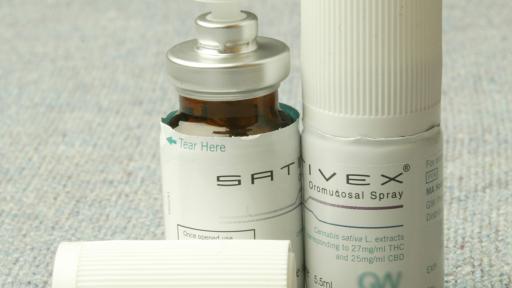Cannabis is a naturally occurring drug made from parts of the cannabis plant.
Cannabis contains many different compounds which are known as cannabinoids. The combinations and proportions of these can differ widely depending on the strain of cannabis plant and how the drug has been prepared.
The two cannabinoids which have been studied the most are tetrahydrocannabinol and cannabidiol.
- Tetrahydrocannabinol (THC) is responsible for the psychoactive effect or 'high' that is associated with cannabis use.
- Cannabidiol (CBD) has anticonvulsant properties and there is good evidence that it can treat severe forms of childhood epilepsy. It does not have a psychoactive effect. CBD is thought to modulate the effects of THC which is why the ratio of THC to CBD can be important.
Medicinal cannabis is used to refer to the use of cannabis for medical purposes rather than for recreational use. This could cover anything from the raw herbal product through to drugs manufactured to pharmaceutical standards which have been tested in clinical trials and been approved by drug regulators for specific conditions.
There is a large body of research looking at the use of cannabis and cannabis based medicines in multiple sclerosis (MS), but the results have been mixed.
Research into cannabis and cannabis based medicines
Cannabis research in the USA
In 2014, the American Academy of Neurology (AAN) reviewed scientific studies on the safety and effectiveness of cannabis use in a range of neurological conditions, including MS. The AAN report concluded that cannabis based medicines in pill or spray form can help to treat certain MS symptoms such as spasticity and spasms, lessen central pain (feelings of burning, pins and needles or numbness) and may lessen frequent urination.
Just two small studies looked at smoked cannabis in MS; both investigated aspects of spasticity. The AAN report concluded the studies did not provide enough evidence to show whether smoked cannabis is effective or safe in MS.
More recently, the US National Academies of Sciences, Engineering and Medicine (NASEM) reported on the health effects of cannabis and cannabinoids following a review of the evidence, with a particular focus on research published since 2011. Their conclusion was that for the majority of conditions there was inadequate evidence to assess the effects of cannabis. However, they did find sufficient evidence that adults with chronic pain treated with cannabis were more likely to experience a clinically significant reduction in pain symptoms.
The NASEM report also confirmed that in adults with MS-related spasticity, short-term use of oral cannabis based medicines could improve patient-reported spasticity symptoms. They also concluded there was some evidence that cannabinoids may help improve short-term sleep in people with some conditions, including chronic pain and MS.
Cannabis research in the UK
The CAMS study, which involved 660 participants around the UK, looked at the effect of oral cannabis extract (containing both CBD and THC), dronabinol (a chemically synthesised form of THC) or placebo on various symptoms of MS, primarily spasticity. Results of this study were mixed, with no significant effect on spasticity as measured by the Ashworth scale. However, there was evidence of a treatment effect on self-reported spasticity and pain, with improvement in spasticity reported in 61% on oral cannabis extract, 60% on dronabinol and 46% on placebo.
The CUPID research trial began in 2006 and involved 493 people with secondary and primary progressive MS at centres around the UK. The MS Trust funded the cost of the MRI scans. The study investigated whether dronabinol (a chemically synthesised form of THC) might have a role in protecting the brain from damage by MS, a concept called neuroprotection. The results of the study were published in 2013. It found that there was no difference between participants who took the cannabis based medicine and those on placebo, with the treatment having no overall effect on the rate of progression.
The MUSEC trial, which reported in 2012, involved 279 people taking oral cannabis extract (containing both CBD and THC) or placebo. The trial found a higher proportion of people on the active treatment had reductions in self-reported muscle stiffness, spasms and pain and improved sleep quality.
Sativex is a cannabis based mouth spray. It is prepared from cannabis plants and contains THC and CBD in equal proportions. It has been studied extensively in clinical trials. In the UK, it is licensed as an add-on treatment for moderate to severe MS spasticity in people who receive inadequate relief from the standard oral anti-spasticity medicines or have experienced unbearable side effects whilst taking these medicines.
Although Sativex can be prescribed in the UK, NHS prescribing remains very limited and varies across the UK.
Cannabis oils are extracts from cannabis plants. Unprocessed, they contain the same active ingredients as the plants, but the balance of compounds depends on the specific plants the oil has been prepared from.
The cannabinoid CBD, is not a controlled substance under the Misuse of Drugs Act. Cannabis oils containing CBD can be sold legally in the UK, providing they contain negligible amounts of THC, do not make any claims for medical benefit and are not sold as medicines.
No clinical studies have been carried out to show whether or not the cannabis oils commercially available in the UK have any benefits in MS. Anecdotally some people with MS say they have found cannabis oils to be beneficial, whilst others have seen no effect.
Despite evidence that cannabis may have some medical benefits, including for people with MS, it has been linked to mental health problems such as anxiety, memory loss, panic attacks and psychotic episodes. There is also the risk of addiction in a small proportion of users. Since short-term memory and processing speed can be impaired in many people with MS, and given that cannabis has been shown to impair cognition in healthy subjects, there is some concern that the use of cannabis could worsen cognitive difficulties in people with MS.
Cannabis is a controlled drug under the Misuse of Drugs Act 1971. Controlled drugs are assigned a Class and a Schedule. The Class (A, B and C) broadly reflects potential for harm, and has legal implications, including penalties for inappropriate supply and possession. Cannabis and many cannabis-based products are assigned to Class B under the Misuse of Drugs Act 1971.
Recognising that potentially harmful drugs do have medical benefit in specific cases, they are also assigned to a Schedule (1-5) which spells out how they can be prescribed and stored.
Historically, cannabis has been assigned to Schedule 1, the most restrictive category, for drugs which are considered to have no recognised medicinal benefit. They cannot be prescribed or held legally with a prescription.
In 2018, a review of cannabis and its scheduling took place, and cannabis-based medicinal products were reassigned to Schedule 2. In November, 2018, specialist clinicians were able to legally prescribe cannabis-based medicinal products to patients with an exceptional clinical need for the first time, under a set of interim guidelines, whilst a full guideline was developed.
In November 2019, Nice (National Institute for Health and Care Excellence) published the full guideline on cannabis-based medicinal products. This states that cannabis-based medicinal products include:
The guideline only covers the prescribing of cannabis-based medicinal products for people with intractable nausea and vomiting, chronic pain, spasticity and severe treatment-resistant epilepsy.
With the exception of nabilone, Sativex and medicines not classed as controlled drugs (such as cannabidiol), the initial prescription must be made by a specialist medical practitioner (a doctor included in the Specialist Medical Practitioner Register). They should also have a special interest in the condition being treated.
After the initial prescription, subsequent prescriptions may be issued by another prescriber as part of a shared care agreement under the direction of the initiating prescriber, if:
- shared care is appropriate and in the person's best interest
- the person's condition is stable
- the other prescriber is confident to make a fully informed prescribing decision about cannabis-based medicinal products.
Sativex
Sativex is assigned to the less-restrictive Schedule 4. This means that Sativex can be prescribed in the UK with no restrictions on supply, recording, storage or destruction. However, cost considerations mean that it is not offered as an NHS treatment in much of the UK.
-
Zajicek J, et al.
Cannabinoids for treatment of spasticity and other symptoms related to multiple sclerosis (CAMS study): multicentre randomised placebo-controlled trial.
Lancet 2003;362(9395):1517-1526.
Summary (link is external)
Zajicek J, et al
Effect of dronabinol on progression in progessive multiple sclerosis (CUPID): a randomised placebo-controlled trial.
Lancet Neurology 2013;12(9):857-865.
Summary (link is external)
Zajicek JP, et al.
Multiple sclerosis and extract of cannabis: results of the MUSEC trial.
Journal of Neurology Neurosurgery and Psychiatry 2012;83(11):1125-1132.
Summary (link is external)
Suryadevara U, et al.
Pros and cons of medicinal cannabis use by people with chronic brain disorders.
Current Neuropharmacology 2016; Oct 31 [Epub ahead of print]
Summary (link is external)
Feinstein A, et al.
What to make of cannabis and cognition in MS: in search of clarity amid the haze.
Multiple Sclerosis Journal 2015;21(14):1755-1760.
Summary (link is external)
Romero K, et al.
Multiple sclerosis, cannabis and cognition: a structural MRI study.
NeuroImage: Clinical 2015;8:140-147.
Summary (link is external)
Pavisian B, et al.
Effects of cannabis on cognition in patients with MS: a psychometric and MRI study.
Neurology 2014;82(21):1879-1887.
Summary (link is external)
American Academy of Neurology.
Medical marijuana in certain neurological conditions.
AAN: Minneapolis; 2014.
Ball S, et al.
The Cannabinoid Use in Progressive Inflammatory brain Disease (CUPID) trial: a randomised double-blind placebo-controlled parallel-group multicentre trial and economic evaluation of cannabinoids to slow progression in multiple sclerosis.
Health Technology Assessment 2015 Feb;19(12):vii-viii, xxv-xxxi, 1-187
Summary (link is external)
US National Academies of Sciences, Engineering and Medicine.
The health effects of cannabis and cannabinoids: the current state of evidence and recommendations for research.
National Academies Press: Washington DC; 2017.
Full report (link is external)
Hurley R.
Cannabis, cannabis everywhere: UK to review medical cannabis policy as Canada plans imminent legalisation for all uses.
British Medical Journal 2018;361:k2695.
Summary (link is external)

